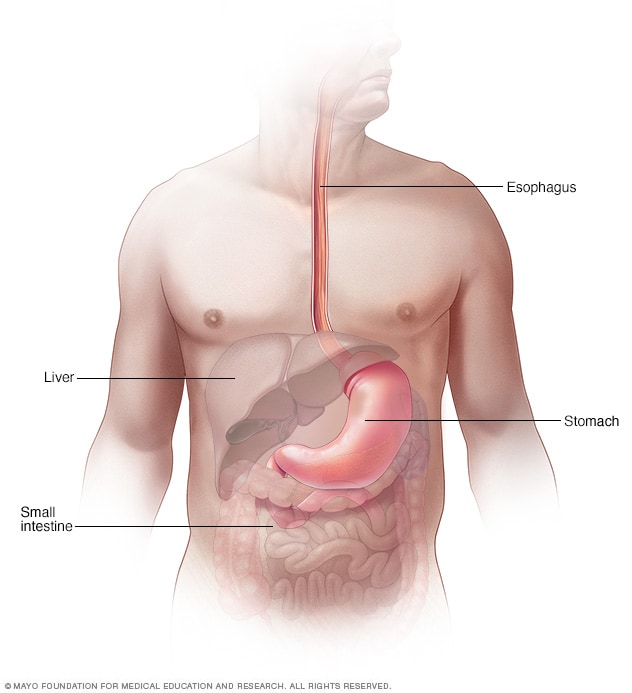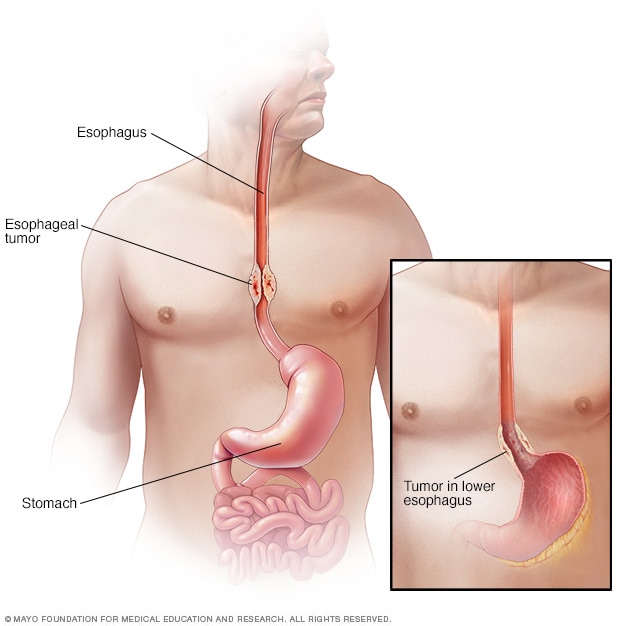Overview
Esophagus

Esophagus
The esophagus is a muscular tube that connects the mouth and the stomach. Rings of muscle called sphincters contract and relax to allow food and liquid to pass.
Esophageal cancer

Esophageal cancer
Esophageal cancer is a growth of cells that starts in the esophagus. It can happen anywhere along the esophagus.
Esophageal cancer is a growth of cells that starts in the esophagus. The esophagus is a long, hollow tube that runs from the throat to the stomach. The esophagus helps move swallowed food from the back of the throat to the stomach to be digested.
Esophageal cancer usually begins in the cells that line the inside of the esophagus. Esophageal cancer can happen anywhere along the esophagus.
Esophageal cancer is more common in men. Risk factors include drinking alcohol and smoking.
Esophageal cancer treatment often involves surgery to remove the cancer. Other treatments may include chemotherapy, radiation or a combination of the two. Targeted therapy and immunotherapy also may be used.
Products & Services
Symptoms
Esophageal cancer may not cause symptoms early on. Symptoms of esophageal cancer usually happen when the disease is advanced.
Signs and symptoms of esophageal cancer include:
- Difficulty swallowing.
- Chest pain, pressure or burning.
- Coughing or hoarseness.
- Weight loss without trying.
- Worsening indigestion or heartburn.
When to see a doctor
Make an appointment with your doctor or other healthcare professional if you have any symptoms that worry you.
Causes
Esophageal cancer happens when cells lining the esophagus develop changes in their DNA. A cell's DNA holds the instructions that tell the cell what to do. In healthy cells, the DNA gives instructions to grow and multiply at a set rate. The instructions tell the cells to die at a set time. In cancer cells, the DNA changes give different instructions. The changes tell the cancer cells to make many more cells quickly. Cancer cells can keep living when healthy cells would die. This causes too many cells.
The cancer cells might form a mass called a tumor. The tumor can grow to invade and destroy healthy body tissue. In time, cancer cells can break away and spread to other parts of the body. When cancer spreads, it's called metastatic cancer.
Types of esophageal cancer
Esophageal cancer is classified depending on the type of cells that are involved. The type of esophageal cancer you have helps determine your treatment options. Types of esophageal cancer include:
- Adenocarcinoma. Adenocarcinoma begins in the cells of the glands in the esophagus. These glands produce mucus. Adenocarcinoma happens most often in the lower part of the esophagus. Adenocarcinoma is the most common form of esophageal cancer in the United States. It affects mostly white men.
- Squamous cell carcinoma. Squamous cell carcinoma begins in the flat, thin cells that line the surface of the esophagus. Squamous cell carcinoma happens most often in the upper and middle parts of the esophagus. Squamous cell carcinoma is the most common esophageal cancer worldwide.
- Other rare types. Some rare forms of esophageal cancer include small cell carcinoma, sarcoma, lymphoma, melanoma and choriocarcinoma.
Risk factors
Risk factors for esophageal cancer include conditions and habits that cause irritation in the esophagus. Risk factors may include:
- A steady habit of drinking very hot liquids.
- Bile reflux.
- Difficulty swallowing because a muscle in the esophagus won't relax, a condition called achalasia.
- Drinking alcohol.
- Gastroesophageal reflux disease, also called GERD.
- Not eating enough fruits and vegetables.
- Obesity.
- Precancerous changes in the cells of the esophagus, called Barrett esophagus.
- Radiation treatment to the chest or upper abdomen.
- Smoking.
Complications
As esophageal cancer advances, it can cause complications. Complications may include:
- A blockage in the esophagus. Cancer may make it difficult for food and liquid to pass through the esophagus.
- Bleeding in the esophagus. Esophageal cancer can cause bleeding. Though bleeding is usually gradual, it can be sudden and severe at times.
- Pain. Advanced esophageal cancer can cause pain.
Prevention
There's no sure way to prevent esophageal cancer, but you can reduce your risk if you:
Ask about esophageal cancer screening
Screening for esophageal cancer may be an option for people with Barrett esophagus. Barrett esophagus is a precancerous condition caused by chronic acid reflux. It increases the risk of esophageal cancer.
If you have Barrett esophagus, ask your healthcare professional about screening. Screening typically involves exams to look at the inside of the esophagus for signs of cancer.
Drink alcohol in moderation, if at all
If you choose to drink alcohol, do so in moderation. For healthy adults, that means up to one drink a day for women and up to two drinks a day for men.
Eat more fruits and vegetables
Choose a healthy diet with a variety of fruits and vegetables. Food sources of vitamins and nutrients are best. Avoid taking large doses of vitamins in pill form, as they may be harmful.
Exercise most days of the week
Aim for at least 30 minutes of exercise on most days of the week. If you haven't been active lately, ask your healthcare professional whether it's OK and start slowly.
Maintain a healthy weight
If your weight is healthy, work to maintain that weight. If you need to lose weight, ask a healthcare professional about healthy ways to lower your weight. Eat fewer calories and slowly increase the amount of exercise.
Stop smoking
Talk to your healthcare team about strategies and aids that can help you quit. Options include nicotine replacement products, medicines and support groups. If you've never smoked, don't start.